this is rly cool. keep this bag away from children made a mixtape of fragments from various poets/writers that’s kinda alice coltrane meets parataxis meets mantra #omshanti #itsnotyourfault
Finches and NOÖs
If it’s real sprang sprung where you are—I mean like pensive warm midnight donut strolls with cicadas under your Keds—then you are feeling all refreshed and full of light, which means your brain is in good shape to read some new online magazine releases.
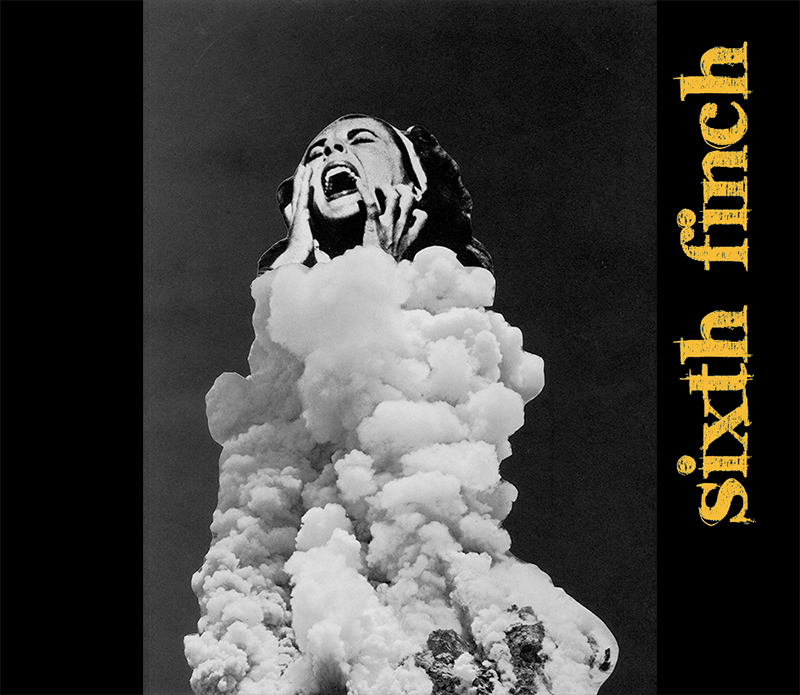 Sixth Finch is bubbling. RIYL science, river walks, cake under bridges, kids doing science on public television, bodies saying something when they’ve had enough of fighting, paper animals, the counterculture of silence, singing into bottles, oxen who think they are cotton, aliens with crew cuts, poison mandrake roots, qualities, the dress you woke up in, car insurance company slogans, felon hearts, intergalactic surfboards, holy slobs, the way every surface can be a cradle, or water in the open knees.
Sixth Finch is bubbling. RIYL science, river walks, cake under bridges, kids doing science on public television, bodies saying something when they’ve had enough of fighting, paper animals, the counterculture of silence, singing into bottles, oxen who think they are cotton, aliens with crew cuts, poison mandrake roots, qualities, the dress you woke up in, car insurance company slogans, felon hearts, intergalactic surfboards, holy slobs, the way every surface can be a cradle, or water in the open knees.
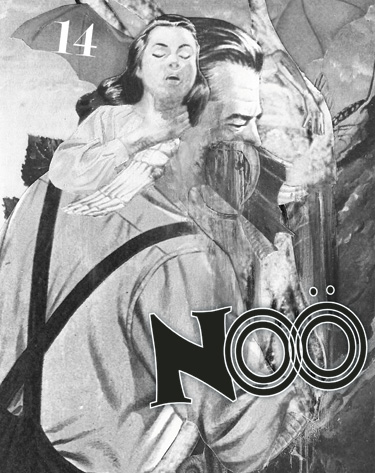 NOÖ Journal is into [14] after a year’s hiatus. There are book vouchings and a list of every book some chucklehead read in 2012. Read NOÖ [14] if your back feels like a shipwreck, if you ever coated Omega 3 capsules with peanut butter, if your body used to like swings and probably still does, if you’ve ever eaten Doritos at breakfast, if it cheers you up to think of Benjamin Franklin inventing electricity even though he lived alone until he was dead, if you like staring up at things that can’t see you below them, looking for a man who tells three lies a day, cooking when you get nervous, gazing spiritually toward the Macho Man, taking turns letting and being let down, afraid to fall asleep on buses, your car on fire in the snow, the screen a scroll, kissing like confusion at the supermarket, Treat Yo Self, (feeling you get in a ball pit), talking in a flashlight lit pool, talking later about creepshots, talking about keeping each other when storms come, tracing dead mouths, selling that brain painting, parabolas the shape of manic depressives, your Soul a scrap of lightning, crappy knowledge, searching the floor for a diamond four, stepping into the rain like a film, dying in a fortlike structure, or the infinite pi of sun.
NOÖ Journal is into [14] after a year’s hiatus. There are book vouchings and a list of every book some chucklehead read in 2012. Read NOÖ [14] if your back feels like a shipwreck, if you ever coated Omega 3 capsules with peanut butter, if your body used to like swings and probably still does, if you’ve ever eaten Doritos at breakfast, if it cheers you up to think of Benjamin Franklin inventing electricity even though he lived alone until he was dead, if you like staring up at things that can’t see you below them, looking for a man who tells three lies a day, cooking when you get nervous, gazing spiritually toward the Macho Man, taking turns letting and being let down, afraid to fall asleep on buses, your car on fire in the snow, the screen a scroll, kissing like confusion at the supermarket, Treat Yo Self, (feeling you get in a ball pit), talking in a flashlight lit pool, talking later about creepshots, talking about keeping each other when storms come, tracing dead mouths, selling that brain painting, parabolas the shape of manic depressives, your Soul a scrap of lightning, crappy knowledge, searching the floor for a diamond four, stepping into the rain like a film, dying in a fortlike structure, or the infinite pi of sun.
I Don’t Know Should Matthew Savoca Get a Dog
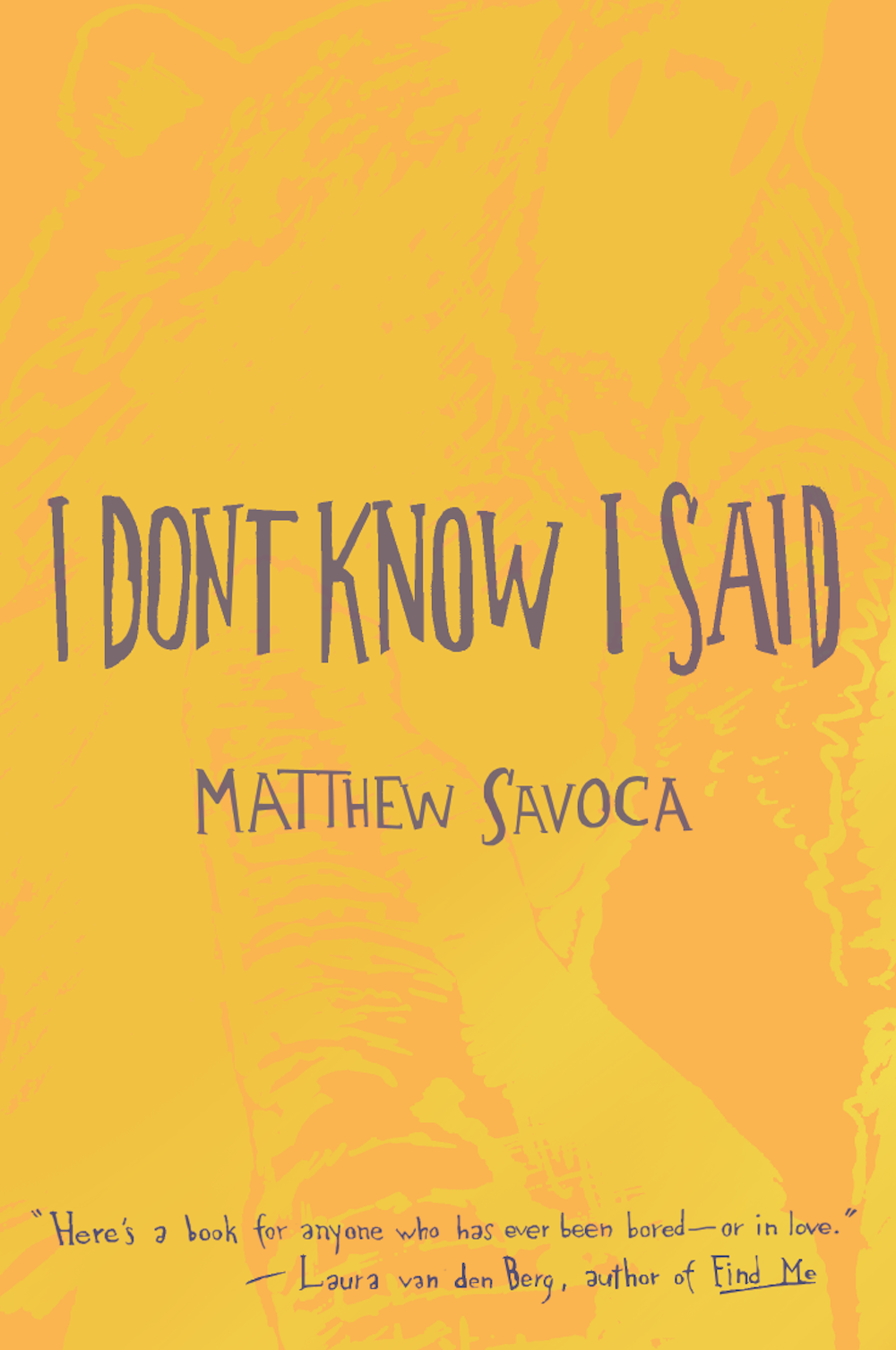
HTMLGiant fave Matthew Savoca just came out with his novel yesterday, improbably titled I Don’t Know I Said. Laura van den Berg said it’s a book for anyone who has ever been bored. Michael Kimball said it’s got more charm than it should ever have. Scott McClanahan said it’s like eating baby food with a loved one. Chris Killen said he’d recommend it to anybody. The book is about Arthur and Carolina, youths in love, trying to do it right. Here’s an interview with Matthew, if you’re bored. On Friday evening Matthew will read the entire novel and broadcast it at Everyday Genius.
Hi Matthew.
Hi Sarah.
25 Points: Billy Lynn’s Long Halftime Walk
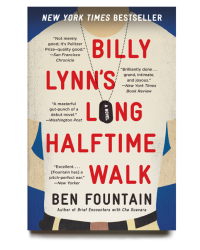 Billy Lynn’s Long Halftime Walk
Billy Lynn’s Long Halftime Walk
by Ben Fountain
Ecco, 2012
320 pages / $14.99 buy from Amazon
1. Fall, 2002. I’m in New Castle, Delaware, dining alone — at Hooters. I hadn’t gone to eat chicken wings at an ironic remove; I was just lonely. I hadn’t finished college, and I was working at a tiny weekly newspaper in a tiny state where I knew no one. It must have been a Saturday; there was a college football game on. I was reading The Atlantic and only intermittently glancing up at the televisions. I’m not sure when I noticed the four fatigue-clad soldiers at a table behind me, nor do I know where my sudden patriotic impulse came from, but I asked my waitress to get them a pitcher of whatever they were drinking, put it on my tab, and not to tell them why they were getting it.
2. The charms of four fit, uniformed men turned out to be more persuasive than those of an overweight sportswriter with wing sauce in his whiskers. Before I was able to pay my check and get the hell out of Hooters, the waitress had fingered me to the table of soldiers. The sergeant (I have no idea if he was a sergeant; he could have been a major corporal or lieutentant admiral for all I know) was tapping me on the shoulder: “Sir? Did you buy this?” He was holding the pitcher of beer. I admitted that I had, and he offered a hearty thanks and a firm handshake, then insisted that I come over to greet the other men.
3. Here’s what I was thinking on the short walk to the soldiers’ table: “Don’t say ‘Thank you for your service.’ Don’t say ‘Thank you for your service.’ Don’t say ‘Thank you for your service.’”
4. You’ve already guessed what I said.
5. In my truck, George Costanza “jerk-store” style, I imagined the speech I’d have given otherwise: “I don’t know what I think about us going to Iraq, but I hope you guys stay safe. … I don’t agree with the war, but I support you guys.”
6. This incident — the peak of my involvement in more than 10 years of American wars; my single “support the troops” moment — has been back in my head ever since I finished Billy Lynn’s Long Halftime Walk, Ben Fountain’s National Book Award finalist and National Book Critics Circle winner. The novel and the memory fire many of the same synapses, engage the same particularly American themes: sex, death, football, and their various intersections.
7. A few months after 9/11, a friend from my rural Missouri high school and I were on the phone together, trying like everyone else to make sense of things. We were on the same page up until he said “I’m sure you were like me. Ready to sign up and go over there.” I mumbled something in agreement, but this had not occurred to me.
8. Neither of us did, of course. Go over there, I mean. We each had options. I was failing out of college, but I had options.
9. Billy Lynn has no options. We meet the 19-year-old PFC on Thanksgiving Day, 2004. He’s in the back of a limo, taking the edge off after a group of patriotic well-wishers having just “trampolined right down the middle of his hangover.”
10. This young boy from central Texas and his squadmates in Bravo Company are about to conclude a two-week, whirlwind “victory tour” with a cameo appearance in the halftime show of the Dallas Cowboys’ Thanksgiving game against the Chicago Bears. Bravo Company (which, it turns out, is not the group’s proper military designation but has been simplified for media digestibility). READ MORE >
April 9th, 2013 / 6:20 pm
The Density at the Center of Everything: A Conversation with Erik Stinson
Erik Stinson is a writer of short fiction and poetry, an essayist, web artist and associate copywriter. I first met him outside a bar in Williamsburg in summer 2010. We skated that night and, later, both, separately, with Miles Ross. I asked him some questions about his life and forthcoming collection of stories, Tropic Midtown, which, like all of his books, he self-published and distributes.
HTMLGiant: You’re sitting at a desk, am I right?
Erik Stinson: Yeah.
HG: How’s the view from your desk right now?
ES: I can see out the window behind me, to a courtyard on the 5th floor, some light from 23rd street via a low building. Air rights etc.
HG: Okay, so you wrote a book called Tropic Midtown. It’s stories. What made you want to write these stories?
ES: I wanted to make certain memories, and unmake others. I guess I wanted to destroy some and shape others.
April 9th, 2013 / 10:29 am
Pataphysical Essays by René Daumal
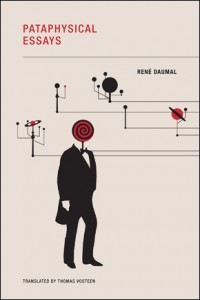 Pataphysical Essays
Pataphysical Essays
By René Daumal
Wakefield Press, April 2012
136 pages, $12.95 (buy it at Wakefield Press)
Rene Daumal is known primarily for his unfinished novel Mount Analogue (which, in ways, was the point of inspiration for Jodorowsky’s Holy Mountain) & his novel A Night of Serious Drinking, a narrative examination of issues of reality and spiritualism, set within the never ending halls and floors of a seemingly infinite pub. To others he’s known as a mystic, studying Eastern currents throughout his life; to others he is simply an ex-surrealist, a primo member of le grand jeu; others know him as the rambunctious teenager of A Fundamental Experiment, taking after Rimbaud in a youthful attempt to escape the banality of reality. He was, of course, all of these things. But what seems to most often, perhaps, get overlooked, is Daumal’s position as a ‘pataphysician.
‘Pataphysics, often simply called “the science of imaginary solutions” is a, shall we say, philosophy created (popularized?) by Alfred Jarry at the end of the 19th century. It’s torch has been carried on through the 20th century and into the 21st–publishers Atlas Press being primarily responsible for the publication of the documents of the College of ‘Pataphysics. There is much playfulness present.
Wakefield Press has recently published a collection of Daumal’s essays on ‘pataphysics, and it’s a wonderfully head-scratching collection that perfect sums up the mood of ‘pataphysics.
READ MORE >
April 9th, 2013 / 1:10 am
What Articles About Twitter Look Like
@adjameson @alecniedenthal @AlissaNutting @amysmcd @Benmirov @blakebutler @brookssterritt @camerainsecura @CatherineLazer @chen_village @david_fishkind @diddioz @esotika @higgschrishiggs @imposedabsence @kenbaumann @kmartsurrealism @KristenIsk @kyle_minor @lispservice @markleidner @matthewjsimmons @melissabroder @mikeayoung @mmkaufman @nickantosca @pompadoured @pubgen @rgay @ryancall @theblogpoetic @weeatherhead @adjameson @alecniedenthal @AlissaNutting @amysmcd @Benmirov @blakebutler @brookssterritt @camerainsecura @CatherineLazer @chen_village @david_fishkind @diddioz @esotika @higgschrishiggs @imposedabsence @kenbaumann @kmartsurrealism @KristenIsk @kyle_minor @lispservice @markleidner @matthewjsimmons @melissabroder @mikeayoung @mmkaufman @nickantosca @pompadoured @pubgen @rgay @ryancall @theblogpoetic @weeatherhead @adjameson @alecniedenthal @AlissaNutting @amysmcd @Benmirov @blakebutler @brookssterritt @camerainsecura @CatherineLazer @chen_village @david_fishkind @diddioz @esotika @higgschrishiggs @imposedabsence @kenbaumann @kmartsurrealism @KristenIsk @kyle_minor @lispservice @markleidner @matthewjsimmons @melissabroder @mikeayoung @mmkaufman @nickantosca @pompadoured @pubgen @rgay @ryancall @theblogpoetic @weeatherhead @adjameson @alecniedenthal @AlissaNutting @amysmcd @Benmirov @blakebutler @brookssterritt @camerainsecura @CatherineLazer @chen_village @david_fishkind @diddioz @esotika @higgschrishiggs @imposedabsence @kenbaumann @kmartsurrealism @KristenIsk @kyle_minor @lispservice @markleidner @matthewjsimmons @melissabroder @mikeayoung @mmkaufman @nickantosca @pompadoured @pubgen @rgay @ryancall @theblogpoetic @weeatherhead @adjameson @alecniedenthal @AlissaNutting @amysmcd @Benmirov @blakebutler @brookssterritt @camerainsecura @CatherineLazer @chen_village @david_fishkind @diddioz @esotika READ MORE >
Spring Breakers?
Anybody else not that big of a fan of Spring Breakers? I didn’t hate it, but I also never felt that excited by it. It felt more like watching MTV mimicking Korine’s prior styles, which I guess is maybe part of the point, but if so I don’t care for the point. I imagine if it’d been listed as directed by Todd Phillips, and that doesn’t seem impossible, no one would have given it a second thought. Having seen Holy Motors shortly after, I can’t help thinking I wish that had been Korine’s next film somehow, at least in breadth.
Talking with Sarah McCarry about The Guillotine Project

Vanessa Veselka & Lidia Yuknavitch’s Violence, Bojan Luois’s Troubleshooting Silence in Arizon,
Kate Zambreno’s Toilet Bowl: Some Notes on Why I Write
Tell me about the Guillotine Project.
Guillotine is an ongoing series of handbound chapbooks with letterpress-printed covers, and each chapbook is a single essay. I’ve been making zines for years, and had wanted to take the leap and publish other people’s work for a while, but wasn’t quite sure what I wanted to be doing. And then last year I sort of stumbled into the opportunity to publish the full version of Vanessa Veselka and Lidia Yuknavitch’s conversation about violence at the Believer blog, which I had loved and found completely brilliant, as well as my friend Bojan Louis’s talk about genocide and book-banning in Arizona.
April 8th, 2013 / 1:01 pm
How to Be a Critic
At the risk of greatly oversimplifying matters, if you want to be a critic, you have two options: to proceed either in good faith or in bad. Both approaches have their limitations.


